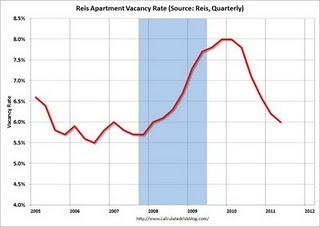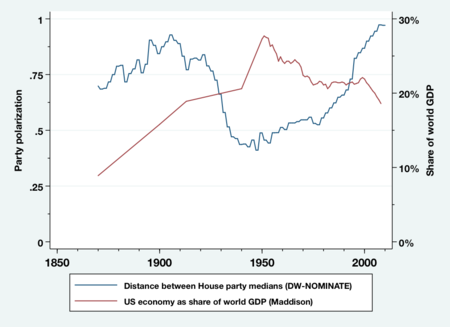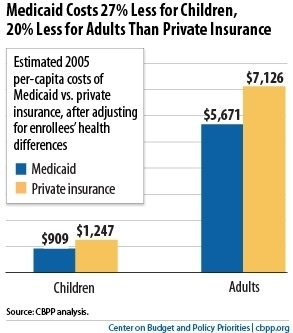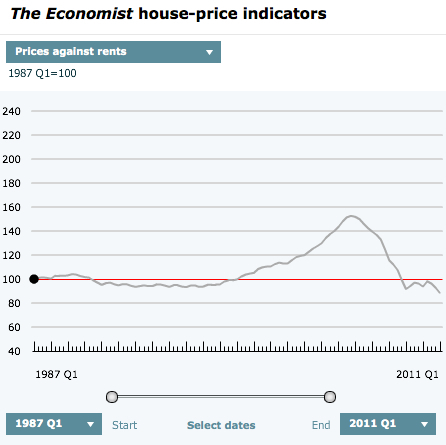Matthew Yglesias's Blog, page 2250
July 7, 2011
Rental Vacancies Plummeting
More on housing as Karl Smith offers a Calculated Risk chart on rental vacancies:

This is despite the anemic pace of household formation. Under the circumstances, rents are bound to go up followed by construction to take advantage of the profit opportunity. The trouble, of course, is that it takes time to actually build houses to meet the demand. In the interim, renters will feel a lot of squeeze.


Historical Perspective On Polarization
Brendan Nyhan brings some historical perspective on partisan polarization in the United States:

The post-World War II economic system was built around the US economy at a time when partisan polarization was relatively low, which increased stability and gave elites substantial room to maneuver in economic policy matters. Now, however, growth in polarization has fueled a debt ceiling standoff that threatens to destabilize financial markets at a time when US still makes up a substantial proportion of the world economy and plays a crucial role in bond and currency markets.
A related point I would emphasize is that not only does the United States play a much larger role in the global economy than it did during the Gilded Age, but the federal government plays a much larger role in the domestic economy. A lapse of appropriations leading to a "government shutdown" had relatively modest implications in 1911 compared to what it means in 2011. Another point about this is that a lot of us who spent much of the past decade noting that rising polarization was simply a return to the pre-New Deal status quo have actually missed the part where polarization has, in fact, rocketed to the highest level on record.


Japan's Success
For years now I've had a sneaking suspicion that there's something to be said on behalf of Eamonn Fingleton's counternarrative about Japanese economic success, but I don't quite agree with his interpretation of all his points. This, though, is the core insight:
It is not necessary to present my entire argument here but a few pointers might be useful. First, it is obvious there is a disconnect between the low officially-calculated GDP growth rate and the visibly rapid improvement in the Japanese people's living standards. Healthcare, eating out, the universal prevalence of all the latest advanced gadgetry (car navigation systems, smart-phones, and large LCD television screens, etc.), clothing quality, and public infrastructure (airports, subway systems, train stations, broadcast and mobile phone signal quality etc.) are only the most obvious areas where the Japanese have progressed well beyond American standards in recent years.
To me the main point to make here is simply that when you start looking at rich countries, which Japan is, it's probably more enlightening to try to make direct inquiries into living standards rather than draw inferences from per capita GDP. Are people healthy? Are they getting healthier? Is there lots of unemployment? Are there horrible traffic jams? Is there lots of crime? What's impressive about Japan over the past 20 years is that they do well on most of these scores. Working age people seem to be able to get jobs, the life expectancy is very high, and the streets are safe.
That said, by American standards, Japanese people have very small houses and in general put up with a lot of crowding. I grew up in Manhattan and think it all looks pretty cool, but it's obvious that lots of Americans seem to put a high value on occupying tons of space and might experience Japan as a huge hit to their living standards.


Michele Bachmann Tries To Transcend Faction
In her latest campaign advertisement, Michele Bachmann ends with the tag line "the unifying choice that will beat Obama."
Paul Waldmann's not impressed: "Move past the awkward grammar, and you have to ask: 'Unifying?' Michele Bachmann is many things, but 'unifying' isn't one that immediately comes to mind."
But that's exactly why this is the right message for her. Bachmann's appeal to grassroots voters in Iowa is clear. She's from the region, and she's identified with the religious conservatism that often drives GOP-side Iowa caucus-goers. Bachmann's problem isn't about assembling a persuasive pitch to that constituency. Her problem is that she doesn't want to end up in the same dead-end as such past Iowa winners as Pat Robertson and Mike Huckabee. She needs to persuade the party in a larger sense that she represents the broad set of concerns that Republicans have and that she's capable of winning a general election campaign. She has a reputation as a "tea party" candidate or a social issues candidate, but to win she needs to try to transcend that and become a unity candidate — a generic Republican, compared to whom it's the others who look factional. The strategy may not work — she just doesn't have the resume of a presidential nominee and nothing she can say changes that — but she seems to understand the problem correctly in a way that superficially more plausible Huckabee never did.


Medicaid Improves Health Outcome
One of the most ridiculous aspects of the recent debate over the Affordable Care Act went as follows. Many people in the United States of America believe quite sincerely that over-taxation of rich people is among the most serious problems the country faces. And the Affordable Care Act does a great deal to increase taxes on rich people and use the funds thereby raised to provide Medicaid to currently uninsured people. Those who oppose such measures want to deny life-saving medical care to the poor and near-poor in order to maintain a low tax burden on the wealthy. In order to justify this proposition politically, it would be useful to pretend to believe that giving uninsured people access to Medicaid doesn't actually benefit them at all. Consequently, lots of diligent Googlers started turning up studies that purported to show this, ignoring contrary studies and all common sense.
At any rate, a new rigorous study from Oregon confirms that Medicaid does, indeed, save lives:
A landmark study released this morning on a major health policy experiment in Oregon provides some hint at what the answer to these questions might be if the ACA becomes a reality. A consortium of researchers from MIT, Harvard, and the state of Oregon has studied the impact of randomly assigning Medicaid insurance to poor Oregonians in 2008 as part of an expansion of the state's health coverage. They found that Medicaid's impact on health, happiness, and general well-being is enormous, and delivered at relatively low cost: Low-income Oregonians whose names were selected by lottery to apply for Medicaid availed themselves of more treatment and preventive care than those who remained excluded from government health insurance. After a year with insurance, the Medicaid lottery winners were happier, healthier, and under less financial strain.
The other thing to note here is that, relative to other options, Medicaid is super cheap to provide:

What this means is that distributional issues aside, taxing people to provide people with Medicaid is an efficient means of organizing health care financing. The problem with Medicaid (and, indeed, the general problem with single-payer programs) is precisely that it's so cheap that health care providers don't like it very much. They'd rather accept patients who have higher-paying private insurance. But there are steps the federal government could take to ensure that providers who want access to the government's vast array of subsidies need to see Medicaid patients.


European Central Bank Continues Tight Money Rampage With Rate Hike Despite 10 Percent Unemployment

One element of sympathy I do have to offer to American policymakers is that they're operating in a global economy featuring many other actors who appear to have completely taken leave of their senses. The European Central Bank, for example, is engaging in its second interest rate increase of the year even though — smug Germans aside — Eurozone unemployment is at 9.9 percent.
Not only would loose money be good for real growth in the Eurozone's depressed economies, a bit of elevated inflation would make the kind of sovereign debt issues they're dealing with much easier to solve. Last, if you think about the problem of divergence between the low unemployment German-led "core" block and the high unemployment periphery, it seems to me that persistent labor shortages in the "core" are exactly what's needed. That should either induce migration from Spain, Portugal, etc. northward to where the jobs are or else induce core-based firms to find ways to shift some production to the periphery. Obviously, that's not an ideal strategy, but the ideal strategy would have been for these different countries with weakly integrated labor markets not to have yoked themselves together in the first place.


What Is The Case Against Calorie Menu Labeling
Another day another article about how requiring restaurants to list the calorie counts of their meals doesn't impact consumer behavior. Personally, I don't find this all that surprising. Behavior tends not to change that much in the short term. I think the real issue here is that you're changing the business environment. A menu labeling rule creates a potential business opportunity for restauranteurs to try to make money with demonstrably healthier offerings, and only time will tell if that opportunity is real and anyone seizes it. But either way, I don't understand what the objection to this kind of policy is supposed to be:
"There is a great concern among many of the people who study calorie labeling that the policy has moved way beyond the science and that it would be beneficial to slow down," said George Loewenstein, a behavioral economist at Carnegie Mellon University who studies calorie labeling. In a recent editorial in the American Journal of Clinical Nutrition, he asked: "Given the lack of evidence that calorie posting reduces calorie intake, why is the enthusiasm for the policy so pervasive?"
Enthusiasm for the policy is so pervasive because the intervention is so utterly mild. Compare that to a proposal for a $100 tax on cheeseburgers. A cheeseburger tax would be extremely burdensome on people who really like cheeseburgers. It's possible that you could persuade me that the public health benefits would be so dramatic that this kind of seemingly arbitrary tax is a good idea, but that'd be a high evidentiary hill to climb. But the long-term financial cost of making people print calorie counts on menus is zero. It's possible that consumers turn out not to care, in which case there's no cost at all. Alternatively, if it does turn out that some firms' interests are adversely impacted by the rule that would have to be because it turns out that consumers actually do care a lot about calorie counts. At worst, there's no impact. At best, you're helping people. Either way, it seems worth doing.
Meanwhile, I do once again want to note that it's difficult to assess the short-term impact here. I lost about 60-70 pounds last year based on rigorously counting calories. But that didn't mean that I never went to Five Guys for a burger and fries, and it also didn't mean that I made "healthier choices" when I did go to Five Guys. Even without menu labeling, I think people know what they're signing up for when they go to a burger joint, and that's fine. Where looking up calories did make a lot of difference was in choosing between different healthy-sounding salad options at places that do have healthy options. Everyone understands that a bacon cheeseburger has a lot of calories, but the gap between the Cobb Salad and the Steakhouse Salad at Chopt isn't obvious unless you actually look it up.


Treasury Eying Plan B Options

Something that I think has gone missing in most discussions of the "constitutional option" of simply ignoring the debt ceiling is that if you think that's illegal, it's not clear what the legal alternative is. Bondholders have a legal right to be paid. But so do Social Security beneficiaries. Contractors have, well, contracts. All the federal government's spending obligations are spelled out in appropriations bills or laws providing for mandatory spending. If you look at any particular option, it seems legally questionable. But obviously something has to be done.
That, I think, is the right context in which to understand Reuters' report on the small Treasury team looking at Plan B measures to avoid a default. They're looking at the constitutional option, they're looking at old memos about payment prioritization, they're looking at the attitude of the New York Fed, etc. Reuters portrays this as somewhat at odds with the fact that "Senior officials, including Treasury Secretary Timothy Geithner, have repeatedly said there are no contingency plans if lawmakers do not give the U.S. government the authority to borrow more money." But the right way to understand this is that Geithner really doesn't have any great tricks up his sleeve. Obviously, if Congress doesn't do the responsible thing, something or other will happen. The U.S. Treasury won't just vanish into a puff of smoke. But anything they do will be legally controversial and probably damaging to American credit.


Ratio Of Home Prices To Rents Now Below Trend
More evidence from the Economist that the US housing market has now undershot on the downside:

That's not to say that we're primed for a return to boomtime levels of employment in the construction industry. But it's strange that we continue to be at bust levels of mass unemployment in construction. The problem, again, is that household formation has fallen way below the population growth trend since lots of people don't have jobs or are heavily indebted. People seem to be doubling up, and we're not building new homes even though supply has gotten tight.


Breakfast Links: July 7, 2011
— Mapping America's cell phone use.
— People need to stop underestimating Michele Bachmann.
— US-Mexico trucking deal.
— Future catastrophes foretold.
— Kent Conrad of the DC budget debate.
— I'm looking forward to learning how to pronounce Pyeongchang.
— The case for aiming higher on high-speed rail.
— China's success doesn't undermine the case for democracy.
— Players' union raising doubts about NBA owners' tales of financial woe. As they should.


Matthew Yglesias's Blog
- Matthew Yglesias's profile
- 72 followers




